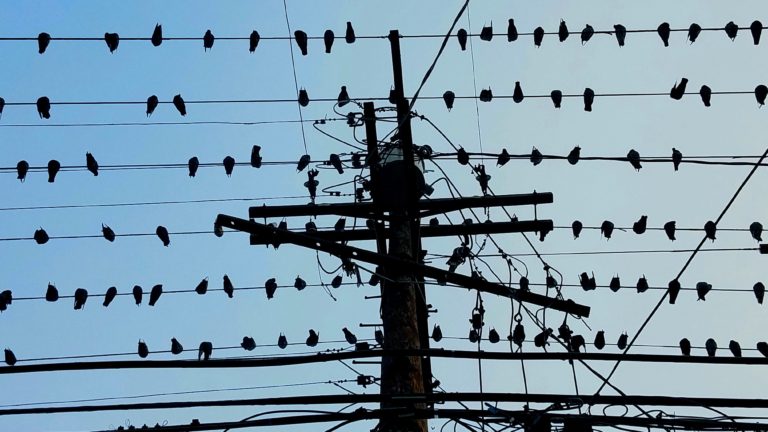Richard Risemberg – Fiction
Sam combed his hair carefully in the mirror, though his hair, despite being softer now that he was getting old,...

A Long Damn Time
Panels of sunlight glowed through the drapes, indicating a bright day outside. It made Sam Rosenstein happy to be meeting his old friend later on. Not just old friend, but old flame: he had been in love with Maggie Lister when he was sixteen, though she hadn’t returned the sentiment. He could understand that, could understand it even back then, when he had been the skinny, bespectacled shy kid who always sat in the back of the classroom but who also always raised his hand with the answer. The kid who does not breed admiration in the adolescent heart. And Maggie Lister was, if not a raging beauty, certainly attractive, more fundamentally attractive than the official beauties they knew: a little heavy, but in all the right places from the perspective of a developing male, easygoing and a bit loud, and immensely talented in music and theater. She could be one of the boys while never letting you forget that she was one of the girls. And she established early on that no one would have the chance to take advantage of her. Her parents had worked in Hollywood, though they were behind-the-scenes types, not actors, and they did not raise a fool.
Sam and Maggie had not been entirely out of touch. A phone call now and then, emails later on, an occasional gathering in force of the old gang. And it had been forty years since they had all first come together. Sam was now going gray; Maggie was a little heavier but still an eyeful. Or so it had been when they’d last met, three years before. That was the last time the whole gang would gather, since Carl Sender had died in a car wreck last year. Carl had moved to Italy to retire in style, and had been buried there. The rest had commiserated over emails and texts. No one phoned any more. They hardly saw each other’s faces, except in overly-posed selfies on social media sites. He wondered what they all really looked like now without their mugs stretched into commercial smiles.
Sam combed his hair carefully in the mirror, though his hair, despite being softer now that he was getting old, was still uncooperative. He didn’t spend much time looking into the mirror these days, as it was not a particularly rewarding experience. Of course it never had been—his wife argued that he was handsomer now than in the photos from his younger days, but he himself didn’t see much improvement. Coarse features in a narrow face, drooping eyes behind glasses, the old-fashioned mustache. Somehow he had managed to marry and spawn two kids. There’s no accounting for taste, he would tell his wife. She would laugh and kiss him. She was still good-looking, by any standard, in her fifties. She hadn’t been one of the gang. No one had married a childhood sweetheart. Maggie had never even dated one of them, though some of the other girls had. They had all, men and women, looked for romance elsewhere, in the end. As if they had been a tribe that knew it needed new blood. But they had been a random collection of kids, different colors, different backgrounds. Identification with the group must be built in to the brain, he thought. He would gladly have married Maggie, who was half Jewish and half Filipina—years back, when she had had a comedy act, she used to introduce herself as “the original pinoy vey girl.” Sam himself was a mishmash of eastern European tribes, most of which no one now living could name.
His wife came in while he was primping and asked him, “Should I be jealous? Your old flame’s looking good in her Facebook feed these days.”
“You’re looking better,” he said. “She’s getting fat.”
“If only I were fat where she’s fat…. Give her my love. But not yours, oh my husband.”
He laughed and buttoned his shirt.
The restaurant was an Italian joint that had dropped several levels of elegance with a change of ownership: formulaic red-sauce platters, the usual pizzas that no one would ever find in Italy, cheap table wines. But it had kept most of the old waiters, including a bald fellow with a handlebar mustache who must have been well into retirement age, and who was actually Italian and actually named Gino. Sam figured he’d keep going there as long as Gino could still shuffle to the booth to bring the acetate-glazed menus and slip him an extra glass of wine off the bill. His own private happy hour. La Terrazza was also halfway between his house and Maggie’s. Maggie had long ago moved to the inner suburbs, which Sam could not abide; he had stayed near downtown, in a neighborhood Maggie approached only when her work required it. Not her day gig, but her part-time career in theater, for she was an actress, and a good one, though not a great one: a lifetime of second lead roles, paying the intrusive seductress when she was younger, the reformed playgirl now that she was heading towards the age when women become living ghosts, invisible in the light of day. She had kept herself visible, though, and audible as well; whenever she arrived someplace, you knew something had happened. He arrived at the restaurant early, as always, and sat himself at the bar to wait for her.
He didn’t wait long: Maggie never missed a cue. He saw men’s heads turn in the mirror beyond the bar, heard a clack-clack of heels that he recognized as her step, and felt a sudden embrace of warm flesh as she wrapped her arms around him from behind and kissed him under the ear. Her tawny smile leered at him in the barroom mirror, overshadowing his own reflection. She let him go and spun him round on the barstool with firm hands. They exchanged Hollywood air kisses and a tilted hug, and Maggie said, “You’re looking good for an old man.”
“Not as good as you are, old woman.”
“Old but bold,” she laughed. “Still fat and sassy. And still working. In my business, that’s worth bragging on.”
“And you will, Maggie, you will.”
“Nothing beats word-of-mouth, and if no one else will do it, I’ll take on the job. Is Gino working tonight? Is he still alive?”
“Holding a table for us, out by the window. Let’s plant our asses there before he gets in trouble.”
“He’ll never get in trouble. More people come here for him than for the food.” She took him by the hand and dragged him to the table, where Gino stood at attention, looking serious as always. Maggie let Sam go and planted a wet one on Gino’s cheek. He accepted it with exaggerated dignity, then bowed them to their seats. The wine glasses were already full. Maggie took the menu he offered then gracefully laid it aside. “You know what I want, Gino. And you probably know what Sam wants too. And if you don’t, we trust you to decide for us. We are your children now, dear man.” Gino bowed and strutted off. Maggie turned her full-wattage smile on Sam. “I have good news, Mr. Rosenstein. The best news ever!”
“Indeed. And what would that be? A contract on Broadway?”
“A contract that was made to be broken: I am finally getting rid of that no-good husband of mine. I got tired of listening to him whine about life while I’ve been carrying his financial ass around for all these years.” Her eyes sparkled with delight, a look Sam suspected she’d been practicing. Then they darkened and fell. “And his drinking. After the last time he unquit drinking, I’d had it with him. Frankly, I don’t even care if he ends up on the street, not anymore. I put up with him for a while—for a long while—because I was worried about that. Especially when the kids were younger. But they’re in college now—thanks to me, and my nagging, and my money. He’s still charming enough for a red-faced lout. He’ll find himself some gal who’ll want to mother him. He’d just better not ask me for references.”
Sam was stunned. Maggie had always put a good face on her marriage to the tempestuous Bobby Boyle, a set builder she’d met at one of her theater gigs.
“And I’m selling the house,” she said. “Which I made sure was in my name, thank god, all those years ago. It’s about the only way to get him out of it.”
“What will the kids think of that? They’ve never lived anyplace else.”
“They’re living at college now, where they are supposed to be learning to think about things of that sort, aren’t they? I’ll have enough cash even after giving their rat daddy some for severance pay; I’ll get a condo somewhere with extra rooms. Maybe downtown near the theaters. Not too far from your place, Sammy. I’ve already got my eye on a three-bedroom.”
“You don’t waste any time, do you?”
“What do you mean, Sam? I wasted twenty-five years. I’d call that a long damn time.”
“We’ve known each other forty-some years. I’d call that longer.”
Her face softened, and she smiled at him—not one of the high-wattage smiles, but something more personal, or so it seemed to him. “Yeah, a long damn time. We were almost sweethearts, way back when.”
“Except, of course, that you wouldn’t have anything to do with me. Back in the day.”
“Maybe I’m a slow learner….” She reached past the plates of spaghetti and took his hand. “But we’ve been loyal to us in our own weird way, haven’t we?”
“There’s nothing wrong with friendship.”
“As far as it goes,” she said. Her hand lingered in his. “Maybe I shouldn’t have been so snooty all those years ago, when you were in love with me. Things might have worked out.”
“Aw, hell, you had lots better choices than the pathetic twerp I was back then.”
“I was too snooty for all of them. To tell you the truth, I married Bobby because I was thirty-two and still hadn’t dropped the hammer on a relationship. And I’m glad: I’ve got my kids. And Bobby was charming. Troublesome, but charming.”
“Those often go together. My first wife was charming. If you like three-alarm fires.” Sam shook his head.
“Well, you got smart quick, as I recall.”
“It was a crash course for sure: Defensive Divorcing 101. Let me tell you….”
“I will. I could use some pointers. When I get settled into the new place, you can come over and tell me all about it. Just you and me, so you can speak freely. I cook better than the kitchen crew here, you know. Though we won’t have Gino.”
Her hand squeezed his. He felt warm all over, and it wasn’t from the wine. Her bright eyes and tawny smile seemed to fill the room. Maybe it was from the wine after all. But he hadn’t had that much yet. He extracted his hand from hers and reached for his glass. “A toast,” he said, raising the glass.
Her eyebrows lifted. “To…what?”
“I don’t know,” he said. “Impossible dreams?”
Her smile became feral, and she winked at him. “‘To dream, the impossible dream.'” She sang it softly, to the tune from the musical. Their glasses clinked, and she looped her arm around his so they drank the toast linked together, leaning close to each other over the table. It was awkward, but they didn’t spill a drop.
Sam Rosenstein slouched in the subway car on the way home, rocking slightly in the empty yellow light and feeling a bit dazed. He found his way out of the station but walked right past his own door when he got home and had to backtrack. When he fumbled the door open, his wife was reading in the living room, huddled in the light of her favorite lamp with the rest of the room in darkness. She looked up, and a worried look creased her brow. “Is everything all right, honey? You didn’t drink too much, did you?”
Sam shook himself, then shook his head. “No, just two glasses of cheap red. But Maggie dropped a bombshell. She’s dumping her husband. And she seemed pretty happy about it.”
“That silly drunk of hers? She should have dumped him long ago, from what I could tell. I never cared for him and his fake jollies. When you consider she could have had a good, steady man like you if she’d had any sense all those years back. The poor thing….”
“Yeah,” Sam said. “The poor thing….”
“Well, we’ll be nice to her, won’t we?”
Sam stared at his wife. “Yeah. We’ll be nice to her. Of course we will.”
“The poor thing. After all these years.”
“The poor thing. It’s been a long damn time. A long damn time.” He kissed his wife on the forehead in the darkened room, and went upstairs to change.



